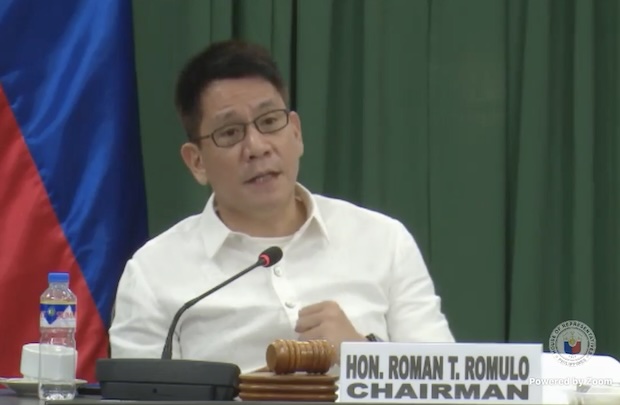
Pasig Rep. Roman Romulo, chair of the House Committee on Basic Education and Culture, presides on Monday, Nov. 6, 2023, over the hearing on a bill to amend the Government Assistance to Students and Teachers in Private Education Act. (Photo from a video posted on the Facebook page of the House of Representatives)
MANILA, Philippines — A House bill proposing amendments to the Government Assistance to Students and Teachers in Private Education Act (Republic Act No. 6728) would allow schools to raise tuition fees without restraint.
Rene Tadle, founder and president of the Council of Teachers, Staff of Colleges and Universities in the Philippines (Cotescup), raised that concern on Monday during a hearing of the House Committee on Basic Education and Culture.
Tadle, a university professor, explained that the current form of the proposed Expanded Government Assistance to Students, Teachers, and Schools in Private Basic Education disregarded Section 5(2) of the current law.
That section mandates that a tuition increase would be granted if 70 percent of it would go to paying the salaries and benefits of both teaching and non-teaching workers — except “administrators who are principal stockholders of the school.”
According to Tadle, the current law also requires that 20 percent of the proposed tuition increase should used for school facility improvement and operational expenses. The use of the remaining 10 percent was not specified but is believed to be intended for return investments for schools.
The still unnumbered substitute bill does not indicate these specific conditions, Tadle pointed out.
‘Adverse consequences’
“Cotescup vehemently opposes the substitute bill in its current form, in its current formulation. Our opposition to the proposed revision is rooted in our firm belief that they could have adverse consequences for the interest of students, parents, teachers, and employees of private schools,” he said.
According to Tadle, this places teachers and employees in a vulnerable position as tuition increases might be uncontrolled because the condition only requires allocation to vouchers — saying that this would eventually affect students and parents as well.
“Because the provision under R.A. 6728 was removed, this shift places private school teachers and employees in a vulnerable position, leaving the future salaries and benefits at the discretion of private school owners. Furthermore, this alteration allows private schools to raise tuition fees without restraint, potentially burdening parents and students,” Tadle said.
“If you’re going to say that it’s the voucher for 70 percent, what happens for example if there are vouchers that are given to schools? Okay, so they will get 70 percent. I think that’s my response. But the point is, there are also schools that would not even have vouchers, but they will have a tuition fee increase. So what will happen?” he added.
Scolded
But Pasig Rep. Roman Romulo, the committee chair, disputed Tadle’s concerns. He said that the bill echoed the terms of the current law — that 70 percent of a tuition hike would go to the salaries and benefits of teaching and non-teaching personnel.
When Tadle insisted that it would be detrimental to teachers and students alike, Romulo scolded him for grandstanding.
“You don’t monopolize this. Please listen, you’re not the only one talking here… So if you do not understand or cannot comprehend it, you can ask us. But to my mind, this is clear,” Romulo said.
“The only thing that I think you brought up which could be valid is what if ‘the school has not received a voucher.’ So we will take that into account. But to grandstand here and tell us that we are making it worse, that is unfair.”
Tadle countered the House was trying to repeal — not amend — the original law so its provisions would be removed and then replaced if the bill in its present form would be enacted.
“It is something that we have to discuss seriously. Why? Because you are actually repealing R.A. 6728 as amended,” Tadle said.
“So by repealing that, what you are saying is that it might make an impression,” Romulo replied, to which Tadle agreed.
Eventually, the committee was not able to approve the substitute measure, agreeing instead to a motion by Camarines Sur 3rd District Rep. Gabriel Bordado Jr. to defer discussions on the bill.
Stakeholders from private schools have been pushing for amendments to the current law.
In 2016, a group of private school administrators asked for an expanded private education subsidy program so that schools could address higher demands set by the K-12 system.
Last January, private education stakeholders urged the government to review the voucher system and educational service contracting (ESC) program to sustain the operations of private schools.